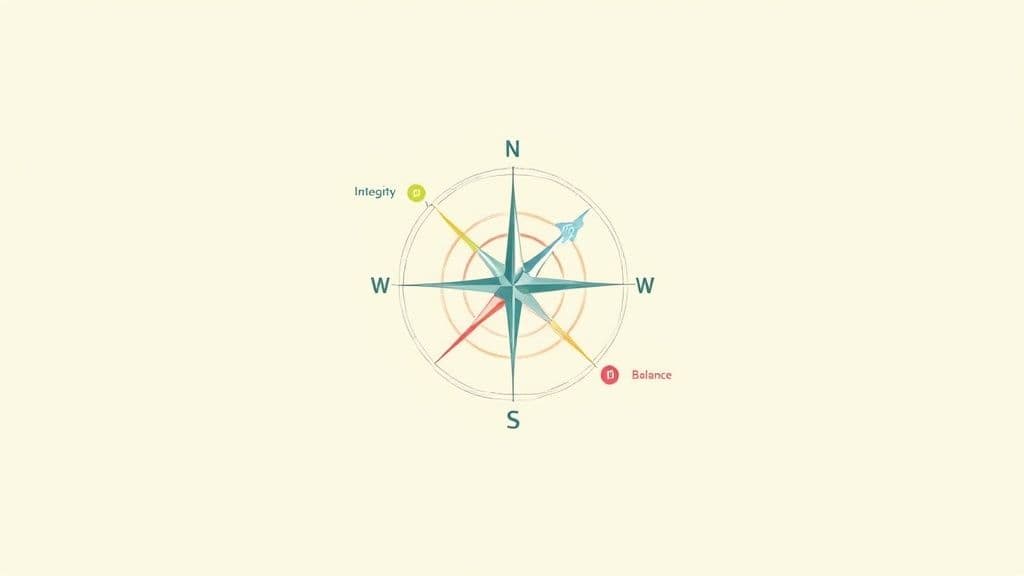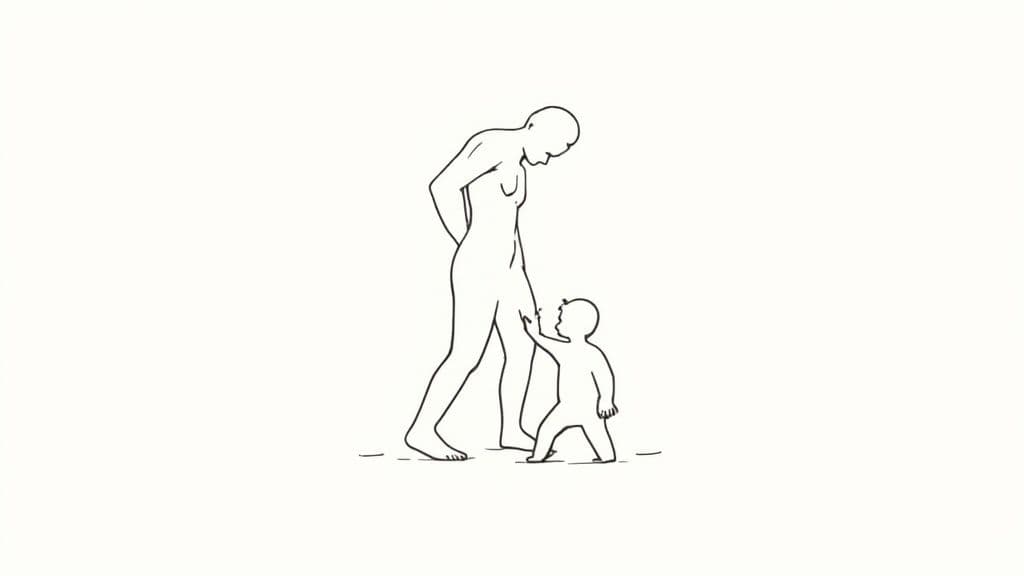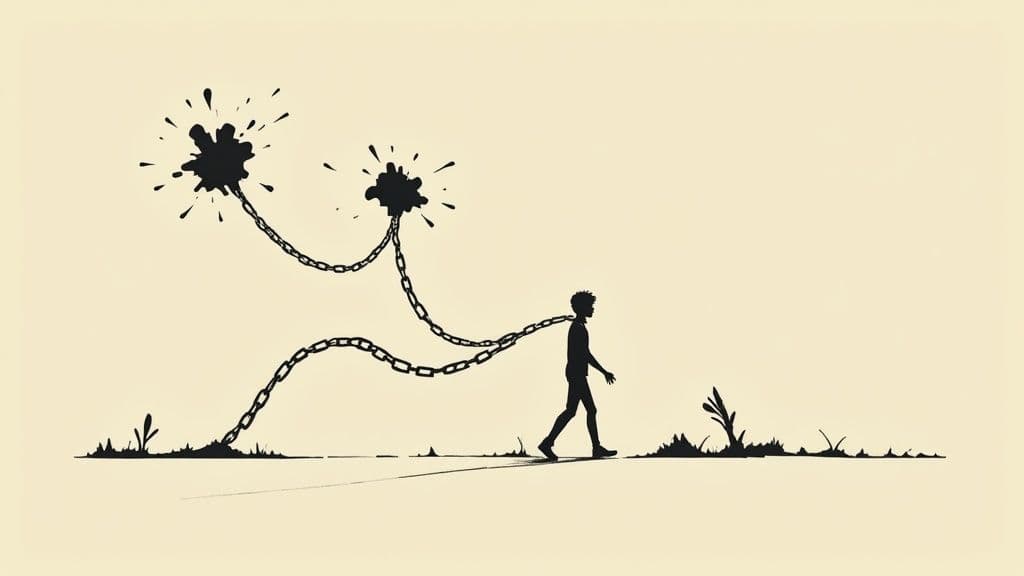Journaling can help you find clarity, heal patterns, and act with greater purpose. These seven practical prompts are organized to guide sustained reflection and help you turn insight into habit and behavior change1.
September 14, 2025 (5mo ago) — last updated January 15, 2026 (1mo ago)
7 Journal Prompts for Self-Discovery (2025)
Seven focused prompts to clarify values, heal patterns, and build lasting habits in 2025.
← Back to blog
7 Journal Prompts for Self-Discovery (2025)
Unlock your potential with seven focused journal prompts that guide introspection, clarify purpose, and inspire action.
Journaling can help you find clarity, heal patterns, and act with greater purpose. These seven practical prompts are organized to guide sustained reflection and help you turn insight into habit and behavior change1.
1. Values: Identify and Align
Understanding what you stand for is the foundation of authentic living. Use these prompts to discover core values and align everyday choices with them.

How to use
- Brainstorm 10–15 values (creativity, security, growth, connection).
- Narrow to your top 3–5 and journal why each matters.
- Test values against past moments of pride or regret.
Action steps
- Do a yearly values audit in your journal and link insights to concrete decisions (see journaling guides: /blog/journaling-guides).
- Use specific scenarios to test alignment and note the outcome.
2. Strengths and Talents: Discover What Energizes You
Focus on what energizes you and what others notice. Strengths-based development improves engagement and performance—people who use their strengths daily are much more likely to feel engaged at work2.

How to use
- Journal about peak moments and flow states.
- Collect feedback from trusted people and note recurring patterns.
Action steps
- Identify 3–5 core strengths and plan weekly ways to use them.
- Combine strengths to form a unique value proposition you can test.
3. Inner Child and Past Influence: Explore Origins of Patterns
Revisit childhood memories and family dynamics to reveal patterns shaping today’s behavior. Healing past wounds can free creativity and reduce reactivity.

How to use
- Write a letter to your younger self.
- Revisit both joyful and challenging memories with compassion.
Action steps
- Start with positive memories to create safety.
- Use third-person narration to create distance when processing painful events.
4. Fear and Limiting Beliefs: Name and Reframe
Name the stories that hold you back and dismantle them with evidence-based journaling. Track small experiments that contradict limiting beliefs.

How to use
- Identify a limiting belief and list evidence that contradicts it.
- Deconstruct worst-case scenarios and plan micro-actions.
Action steps
- Keep a “courage log” of times you acted despite fear.
- Start with low-risk experiments to rebuild confidence and record outcomes.
5. Life Vision and Purpose: Clarify Meaning and Direction
Clarify what gives your life meaning by exploring your ideal future and the impact you want to make. Structured systems can help turn ideas into manageable experiments4.
How to use
- Imagine life with no limits: what would you do?
- Identify problems you’re drawn to solving and why they matter to you.
Action steps
- Try small, purpose-aligned actions before making big changes.
- Consider multiple complementary purposes across different life roles.
6. Relationship Patterns: Analyze Your Social Self
Examine how you relate to others to build healthier, more authentic connections.
How to use
- Journal highs and lows across relationships to find patterns.
- Explore attachment styles, triggers, and recurring roles.
Action steps
- Script new responses in your journal to practice boundary setting.
- Ask for gentle feedback and reflect on your reaction.
7. Emotional Intelligence and Self-Regulation: Track and Respond
Grow awareness of emotion patterns and learn to respond intentionally. Emotional intelligence strongly predicts workplace performance and leadership outcomes3.
How to use
- Track emotions with time, triggers, and physical sensations.
- Name feelings precisely using an emotion wheel.
Action steps
- Validate emotions in writing before problem-solving.
- Practice “pause and respond” and record what changes.
Prompts Comparison: Quick Reference
| Prompt Category | Difficulty | Resources | Outcomes | Use Case |
|---|---|---|---|---|
| Values | Medium | Low | Clear decisions | Life choices |
| Strengths | Medium | Low–Medium | Focused energy | Career growth |
| Inner Child | High | Medium | Emotional healing | Trauma work |
| Fears | Medium–High | Low–Medium | More courage | Overcoming blocks |
| Vision | Medium | Low | Direction | Long-term planning |
| Relationships | Medium | Low | Better connections | Social skills |
| Emotional IQ | Medium | Low | Self-regulation | Stress management |
Turning Insight into Action
Your journal is a map, not the destination. Pick one theme and commit to it for 30 days. Daily or weekly prompts, tracking small wins, and translating insight into a single next action builds habit. Habit formation takes time; repetitive practice helps new behaviors stick and often requires weeks of consistent effort5.
Examples
- Value: If creativity is core, block one hour each week to create and journal the result.
- Fear: If you feel “not qualified,” take a micro-course and journal progress after each module.
- Relationship: If you crave connection, schedule one deep conversation and reflect on what changed.
Pair personal reflection with a structured life-purpose practice to speed clarity and strengthen direction4.
Practical Resources
- More journaling tips: /blog/journaling-guides
- Tools and apps for clarity: /tools
- Download the Life Purpose App: https://lifepurposeapp.com
FAQs
Q: How often should I journal to see results? A: Start with 3–5 minutes daily or 20 minutes three times a week. Consistency matters more than duration; small, regular entries build insight over time1.
Q: What if prompts bring up difficult emotions? A: Use self-compassion techniques—start with joyful memories, take breaks, and seek support if trauma emerges. Consider pairing journaling with a therapist for deep healing.
Q: Can journaling really change habits and decisions? A: Yes. Reflecting on values and tracking small actions creates repeated, conscious choices that shape behavior and priorities.
Quick Q&A
Q: Which prompt should I start with? A: Begin with values or strengths to build clarity quickly; these yield practical choices you can test right away.
Q: How do I measure progress? A: Track small, repeatable actions and a weekly “win” log in your journal. Revisit earlier entries monthly to spot shifts.
Q: What if I get stuck? A: Narrow your focus to one micro-experiment for 7–14 days. Small wins reduce overwhelm and create momentum.
Key Q&A (Concise)
Q: What’s the fastest way to see journaling benefits? A: Pick one prompt area, commit to a daily 3–5 minute practice for 30 days, and record one small action each week.
Q: How do I stay safe when writing about trauma? A: Start with grounding and positive memories, use third-person distance if needed, and seek professional support for deep trauma work.
Q: Which tools help turn insight into action? A: Use habit trackers, calendar blocks for purpose-aligned activities, and structured reflection templates—see /tools.
Ready to deepen your work? Use one category for 30 days, track experiments, and revisit entries to measure growth. Your journal can become a reliable companion on the path to clearer choices and a more intentional life.
Discover Your Life Purpose Today!
Unlock your true potential and find your life’s purpose.
